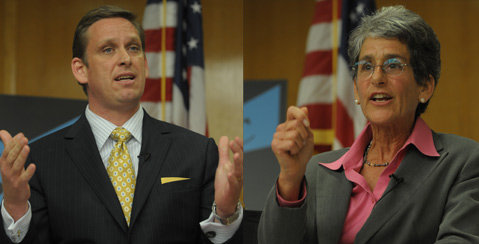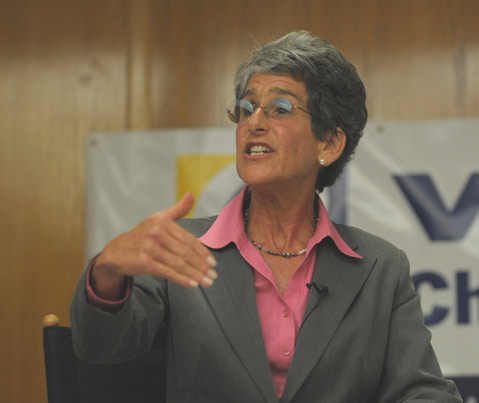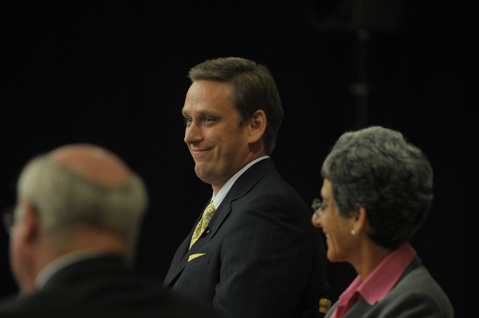Strickland vs. Jackson: California’s Showcase Race
All Golden State Eyes in the 2008 Election Are Focused on This Central Coast State Senate Showdown

Whoever wins the showcase race for California’s 19th state senate seat will represent a district roughly the size of Connecticut that holds 25 percent more people than live in Alaska.
In a year when the presidential campaign in California is a no-contest walkover, the 19th District conflict is, by contrast, a high-stakes, fiercely competitive, and too-close-to-call classic clash that pits a liberal Democratic woman against a conservative Republican man, providing voters a choice of political records and philosophy that could not be clearer. Hannah-Beth Jackson, the Santa Barbara Democrat, and Tony Strickland, the Moorpark Republican, are both former varsity college athletes who served together for six years in the state’s Assembly. The similarities end there: On issues from gay rights to the government’s role in the economy, Jackson and Strickland offer policy solutions and enjoy political support from opposite ends of the ideological spectrum. The key to the race is the one-fifth of voters in the middle.
With Democrats in Sacramento just two votes shy of the crucial two-thirds majority needed to pass a budget or override a veto, political professionals view the campaign as the most important legislative contest of 2008-and one that may well become the most expensive in history. Here is a breakdown of the critical factors in the race, along with some on-the-road observations of the two rivals on the campaign trail.
The Candidates

The 58-year-old Jackson grew up a Celtics fan in Massachusetts, where she was a junior national tennis champion, then played on her college team at Claremont-Scripps College. After Boston University law school, she landed in the Santa Barbara District Attorney’s office for two years, and then moved to L.A., where she worked for the City Attorney and also met George Eskin, now an S.B. Superior Court judge, whom she later married. After several years in private practice, she was elected in 1998 to the Assembly, where she earned a reputation as a tough-talking liberal who challenged tobacco, insurance, and other corporate special interests. She left after six years because of term limits, became a part-time instructor at UCSB, helped organize a statewide progressive political network, and successfully battled breast cancer. She and Judge Eskin have one daughter, who attends USC law school.

The 38-year-old Strickland is a Lakers fan who was born and raised in Ventura County, the son of an Army drill sergeant and a German immigrant mother. Bitten by the political bug when he played Ronald Reagan in an elementary school debate, Strickland started hanging house signs at age 12 for GOP movement conservative Tom McClintock, who took him on as a protege. After McClintock went to Sacramento, Strickland worked as his district representative and learned how to run campaigns. In 1998, the same year as Jackson, he was elected to the Assembly, the youngest member of the body. He moved quickly into a partisan leadership position, became a reliable vote for the conservative caucus, and won national attention when he sued Gov. Gray Davis to disclose the terms of long-term power contracts he’d negotiated in secret. In 2006, he lost a bid for state controller. His wife, Audra, succeeded him in the Assembly; the couple has two young children.
The Voters
The 19th Senate District sprawls geographically from Lompoc through Ventura County all the way to Santa Clarita, and politically from the lefty precincts in Isla Vista to the Ronald Reagan Presidential Library’s home in reliably conservative Simi Valley. Almost two-thirds of the district’s voters live in Ventura County, just under one-third in Santa Barbara County, and about 7 percent residing in L.A. County. Originally crafted as a safe Republican seat for McClintock in 2001, the district’s Democratic registration grew significantly in recent years while the GOP’s declined, mirroring a statewide trend. An analysis by the Ventura County Star showed that six of the 11 cities in the district-Lompoc, Camarillo, Moorpark, Thousand Oaks, Simi Valley, and Santa Clarita-backed President Bush in 2004, while the other five-Goleta, Santa Barbara, Carpinteria, Ventura, and Ojai-voted for John Kerry. Republicans now outnumber Democrats 39.5-37.5 percent, with about 18 percent decline-to-state independents.
The Stakes
At a time when gerrymandering has made competitive legislative races rare in California, both parties badly want to win the 19th District. For Democrats, a Jackson victory would put them within one vote of the 27 needed for a two-thirds majority in the 40-member Senate; because GOP Senator Abel Maldonado of Santa Maria has joined Democrats on some key issues in the past, this could enable the party to overcome GOP resistance on the budget and other fiscal issues. The two-thirds vote requirement is the one tool that outnumbered legislative Republicans have, and they are loathe to lose a seat drawn to remain in their column. This means that both parties, as well as independent campaign committees financed by special interests, will pour enough money in the campaign for TV ads to make it the most costly in the state, perhaps the most in history.
The Messages
With independent voters the key to the race, both candidates are working to rub off the rough ideological edges on their campaign messages.
On the Assembly, Jackson won high marks from liberal interest groups like the California Labor Federation and the League of Conservation Voters, while earning bottom rank numbers from business and taxpayer groups. But on the trail and in her campaign literature, she defines the race as being about effectiveness. She casts Strickland as “an extremist” unable to reach across the partisan aisle, while describing herself as an “independent and effective” problem-solver “fighting for our families” in a bipartisan way. “Politics is the art of compromise,” she said in a speech in Simi Valley. “This is not about ideology; this is about families, and moving things forward.” On Strickland’s behalf, an independent expenditure committee has broadsided Jackson as a free-spending liberal with a relax-with-the-facts TV ad casting her as “Taxin’ Jackson.”
Strickland’s special interest group ratings in the Assembly were the mirror opposite of Jackson’s. Largely unknown in Santa Barbara’s part of the district, he has introduced himself through TV ads, mailers, and speeches as a “renewable energy businessman.” Citing his $5,000 ownership stake in a start-up company called GreenWave Energy Solutions, he identifies growing the economy as the key campaign issue, arguing in his stump speech that the state should move aggressively, with tax incentives and relaxed permit requirements for alternative energy companies-“wind, wave, solar, biodiesel, everything”-which in turn will ease state budget woes. The Jackson camp responded with an attack ad noting his company has no employees and has done nothing but file an incomplete federal application to get into the wave energy business.
The Issues
Jackson and Strickland differ on virtually every substantive issue, except for reapportionment; both support Prop. 11, the governor’s plan for redistricting reform. Here are some key areas where they differ:
• Government’s role: Jackson believes that state government should be a “full partner” with private business and the nonprofit sector in finding programmatic solutions to a range of social and economic problems. Strickland believes that government is often an obstacle to investment, should be downsized, and some of its functions should be privatized.
• Two-thirds vote: In the wake of the just-completed budget debacle in Sacramento, there is a new move for a constitutional amendment to reduce the vote needed to pass spending legislation, from a two-thirds majority to 55 percent. Jackson favors such a change; Strickland opposes it.
• Abortion rights: Jackson has a consistent and strong pro-choice record; Strickland is pro-life and has voted against abortion rights except in cases of rape, incest, or the mother’s life being in danger. In an attack mailer, Jackson cites a campaign questionnaire he filled out several years ago in which he said he supported abortions only if the mother’s life was at risk. Strickland says it was an inadvertent “mistake” on his part. Jackson opposes Prop. 4, which would require parental notification for teenagers younger than 18 to receive an abortion; Strickland favors it.
• Gay Rights: Strickland favors Prop. 8, which would ban marriage for gay people in California; Jackson opposes the measure.
• Public Education: Jackson favors increased public funding for K-12 education; Strickland says that money for schools has been poorly managed and that parents should receive vouchers to send their children to the schools of their choice.



